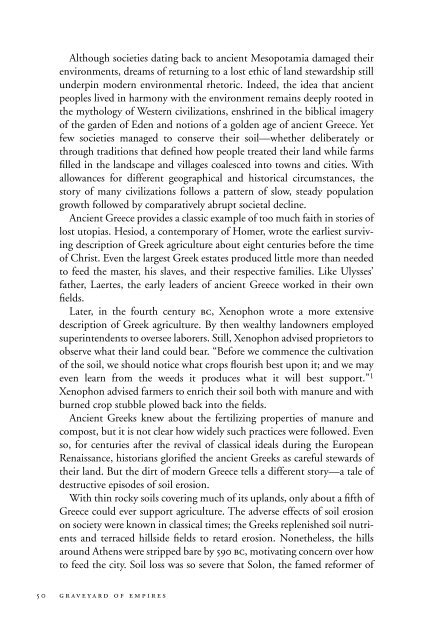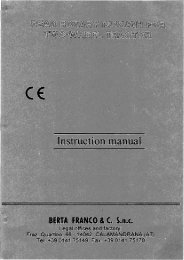Dirt: The Erosion of Civilizations - Kootenay Local Agricultural Society
Dirt: The Erosion of Civilizations - Kootenay Local Agricultural Society
Dirt: The Erosion of Civilizations - Kootenay Local Agricultural Society
Create successful ePaper yourself
Turn your PDF publications into a flip-book with our unique Google optimized e-Paper software.
50<br />
Although societies dating back to ancient Mesopotamia damaged their<br />
environments, dreams <strong>of</strong> returning to a lost ethic <strong>of</strong> land stewardship still<br />
underpin modern environmental rhetoric. Indeed, the idea that ancient<br />
peoples lived in harmony with the environment remains deeply rooted in<br />
the mythology <strong>of</strong> Western civilizations, enshrined in the biblical imagery<br />
<strong>of</strong> the garden <strong>of</strong> Eden and notions <strong>of</strong> a golden age <strong>of</strong> ancient Greece. Yet<br />
few societies managed to conserve their soil—whether deliberately or<br />
through traditions that defined how people treated their land while farms<br />
filled in the landscape and villages coalesced into towns and cities. With<br />
allowances for different geographical and historical circumstances, the<br />
story <strong>of</strong> many civilizations follows a pattern <strong>of</strong> slow, steady population<br />
growth followed by comparatively abrupt societal decline.<br />
Ancient Greece provides a classic example <strong>of</strong> too much faith in stories <strong>of</strong><br />
lost utopias. Hesiod, a contemporary <strong>of</strong> Homer, wrote the earliest surviving<br />
description <strong>of</strong> Greek agriculture about eight centuries before the time<br />
<strong>of</strong> Christ. Even the largest Greek estates produced little more than needed<br />
to feed the master, his slaves, and their respective families. Like Ulysses’<br />
father, Laertes, the early leaders <strong>of</strong> ancient Greece worked in their own<br />
fields.<br />
Later, in the fourth century bc, Xenophon wrote a more extensive<br />
description <strong>of</strong> Greek agriculture. By then wealthy landowners employed<br />
superintendents to oversee laborers. Still, Xenophon advised proprietors to<br />
observe what their land could bear. “Before we commence the cultivation<br />
<strong>of</strong> the soil, we should notice what crops flourish best upon it; and we may<br />
even learn from the weeds it produces what it will best support.” 1<br />
Xenophon advised farmers to enrich their soil both with manure and with<br />
burned crop stubble plowed back into the fields.<br />
Ancient Greeks knew about the fertilizing properties <strong>of</strong> manure and<br />
compost, but it is not clear how widely such practices were followed. Even<br />
so, for centuries after the revival <strong>of</strong> classical ideals during the European<br />
Renaissance, historians glorified the ancient Greeks as careful stewards <strong>of</strong><br />
their land. But the dirt <strong>of</strong> modern Greece tells a different story—a tale <strong>of</strong><br />
destructive episodes <strong>of</strong> soil erosion.<br />
With thin rocky soils covering much <strong>of</strong> its uplands, only about a fifth <strong>of</strong><br />
Greece could ever support agriculture. <strong>The</strong> adverse effects <strong>of</strong> soil erosion<br />
on society were known in classical times; the Greeks replenished soil nutrients<br />
and terraced hillside fields to retard erosion. Nonetheless, the hills<br />
around Athens were stripped bare by 590 bc, motivating concern over how<br />
to feed the city. Soil loss was so severe that Solon, the famed reformer <strong>of</strong><br />
graveyard <strong>of</strong> empires






